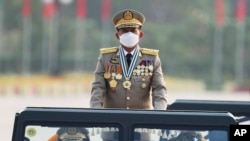BANGKOK, Thailand — The leader of Myanmar’s military-installed government offered Friday to participate personally in proposed peace talks with ethnic minority groups that have long sought greater autonomy through armed struggle.
Senior Gen. Min Aung Hlaing said in a brief broadcast on state television that he wants to meet the leaders of all ethnic armed groups in person to negotiate an end to armed conflict across the country this year.
Spokespeople for two major ethnic minorities, the Kachin and the Karen, indicated no immediate interest in the offer. Both groups are actively resisting attacks by the army, including by air and artillery.
Min Aung Hlaing’s proposal is the latest in a series his administration has made to armed ethnic organizations since the military seized power in February last year from the elected government of Aung San Suu Kyi. None has shown any progress,
The central government has for decades battled the armed groups, which hold loose control of border regions where their ethnic groups predominate. There have been occasional cease-fire agreements but the armed groups seek permanent and comprehensive political solutions in response to their demands, something no Myanmar government has accepted.
The military had generally been able to contain fighting to ethnic-controlled areas, but has faced a broader challenge since its takeover last year.
Popular nonviolent protests against military rule were put down with lethal force, triggering armed resistance that has now become what some experts call a civil war, extending violent conflict to previously peaceful areas of the country.
Despite an overwhelming advantage in weapons and manpower, the security forces have been unable to quash the resistance, and now face a loose alliance of ethnic minority forces with newly formed militias opposed to military rule.
Min Aung Hlaing has urged the ethnic armies not to support the groups opposed to army rule, which his administration has designated as terrorists.
In his remarks Friday, which lasted less than three minutes, he said he wanted to meet with ethnic leaders for peace talks in order for Myanmar’s people “to enjoy the essence of peace and development.”
He said he wants to meet with them in person, and that every leader could bring two other members with them. He appealed to the ethnic armed groups to submit names of participants by May 9, and said a date would be set for the actual talks after negotiations.
“I urge all of you to collaborate for the benefit of all the people of the Union,” Min Aung Hlaing said.
He has previously made clear he will not talk with the National Unity Government, an umbrella group resisting army rule, and its armed units, which call themselves People’s Defense Forces. On Armed Forces Day last month, he vowed that the military would “annihilate” the People’s Defense Forces.
Col. Naw Bu, head of the Information Department of the Kachin Independence Army, a major ethnic armed group from northern Myanmar, said it is too early to comment on Min Aung Hlaing’s remarks.
He told The Associated Press his personal opinion is that Min Aung Hlaing proposed the talks because his administration faces a military and political crisis.
Padoh Saw Taw Nee, head of the Foreign Affairs Department of the Karen National Union, a major ethnic armed group in southeastern Myanmar, said no one from his organization would attend peace talks unless its demands were met. He said these include the military’s withdrawal from politics, implementation of federal democracy and acceptance of international involvement in solving the country’s crisis.
He said he believes Min Aung Hlaing made the offer of peace talks because the military government was failing in many respects, including in its battlefield offensives.







